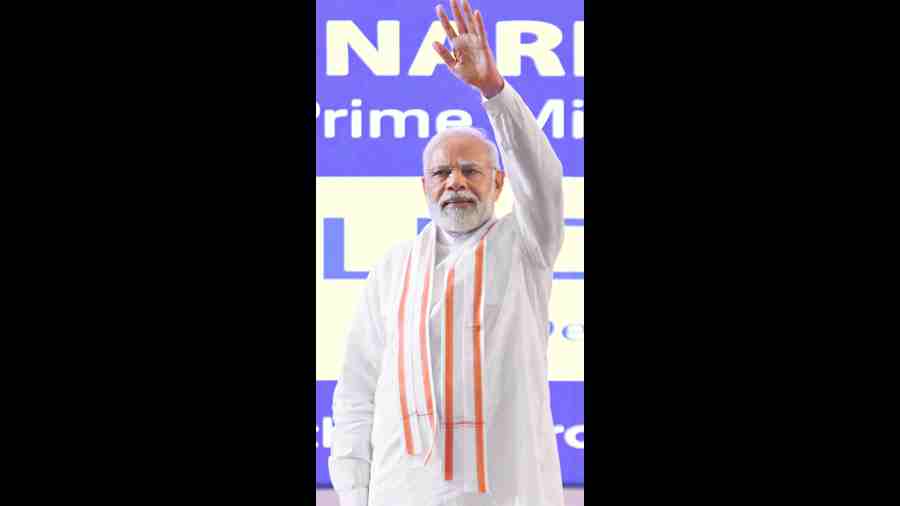Back to the roots
Among books to look out for in 2023, the Financial Times has picked Gujarat Under Modi: Laboratory of Today’s India by Christophe Jaffrelot, a professor of politics and sociology at King’s College London. “Gujarat was not only Modi’s launch pad, it was also his laboratory where he experimented [with] the strategies he has subsequently implemented on the national stage: communal polarisation, de-institutionalisation of the rule of law, crony capitalism, national populism and social conservatism,” the author tells me. Some of the chapter headings give a flavour of the line Jaffrelot has taken: “From Hindu traditionalism to Hindutva via caste and communal violence”; “Modi vs ‘Islamist threats’ in 2002: the new ‘Emperor of Hindu Hearts’”; “The saffronisation of police and the judiciary”; “A new brand of crony capitalism”.
The FT described the book as “an account of the prime minister of India’s time as chief minister of his home state — a period defined by a combination of economic growth and religious polarisation and pogroms which the author argues served as a template for national government”.
The book is being published in the UK in April by Hurst, which says: “In 2002, an anti-Muslim pogrom of unparalleled ferocity occurred in Gujarat, leading to the biggest number of Muslim deaths since Partition. The state’s Hindu majority immediately rallied around Modi… polarisation was key to Modi’s strategy there, and he has deployed that strategy again and again since he became Prime Minister of India in 2014... A marketing genius, his messaging combines the politics of Hindutva with economic modernisation, to the clear appreciation of Gujarat’s middle class.” Jaffrelot’s last work was Modi’s India: Hindu Nationalism and the Rise of Ethnic Democracy.
Infamy sells
Charles Sobhraj, who has been released from prison in Nepal after serving 19 years for a double murder, is on his way to London to see Farrukh Dhondy, who knows the serial killer as well as anybody. “Of course, he’s not changed, but he’s not going to kill anybody,” Dhondy assures me. “He’s had enough of that. And I don’t think he’s going to try anything openly illegal. I think he wants to go straight because he’s afraid of spending what life he has left back in custody.”
Sobhraj, aged 78, son of an Indian father and a Vietnamese mother, has French nationality through his stepfather. He sent a message asking Dhondy for a meeting. Dhondy has been approached by producers who want to turn his book, Hawk and Hyena, into a feature film. The book, a factual account of what Dhondy knows about Sobhraj, is currently enjoying brisk sales on Amazon. Sobhraj, nicknamed ‘The Serpent’, does not want to admit to any of the 20 killings in which he has been implicated, but wants to make money by trading on his notoriety. When Shekhar Kapur once proposed a film on him which accused him of 52 murders, Sobhraj turned to Dhondy with a pained expression: “Fa’ook, where did you get this fifty-two? That’s an exaggeration, isn’t it?”
Sleep well
Like Rishabh Pant, I once dozed off and crashed my car. What probably saved me was that I was driving a Volvo 740, a Swedish tank of a car. In 1994, I was doing two jobs — my normal one at The Sunday Telegraph , and spending long evenings as launch editor of the London edition of The Asian Age . In the early hours of the morning, I fell asleep at the wheel and hit a parked car, rather than oncoming traffic.
After Pant’s miraculous escape, I read the guidance from the UK’s The Automobile Association: “Winding down the window or turning the radio up aren’t effective at combatting tiredness. If you find yourself doing these things, it’s a sign you are sleepy and need a break. At the first sign of tiredness, stop and take a break. Stop in a safe place — don’t stop on a motorway hard shoulder. Take a short nap of around 15-20 minutes.”
Great honour
The economist, Sir Partha Dasgupta, has been given a very high honour — Knight Grand Cross of the Order of the British Empire — “for services to Economics and to the Natural Environment”. The honour dates back to 1917 and very few of them are made. The accolade is a recognition of Dasgupta’s landmark review, The Economics of Biodiversity, which has been taken seriously by governments around the world. He argues that GDP is no longer an adequate measure of how well a country is doing but that governments should monitor their natural resources such as forest cover and wetlands. His recommendations include the setting up of an international organisation “like the World Bank” to safeguard the health of the oceans. Dasgupta tells me that has already talked to India’s finance ministry and will be giving a lecture in Bangalore later this year.
Footnote
Rishi Sunak’s wife, Akshata Murty, generally keeps a low profile but, exceptionally, she has allowed her closest friends to talk to Tatler which has made her the subject of a largely positive cover story in the current issue of the glossy magazine. The PM’s wife has tastefully redecorated the flat above 10 Downing Street, but Tatler says that, unlike Boris Johnson, “all of this was paid for by the Sunaks, at a very substantial, undisclosed cost”.











